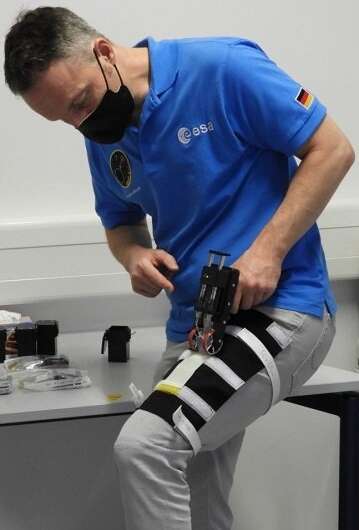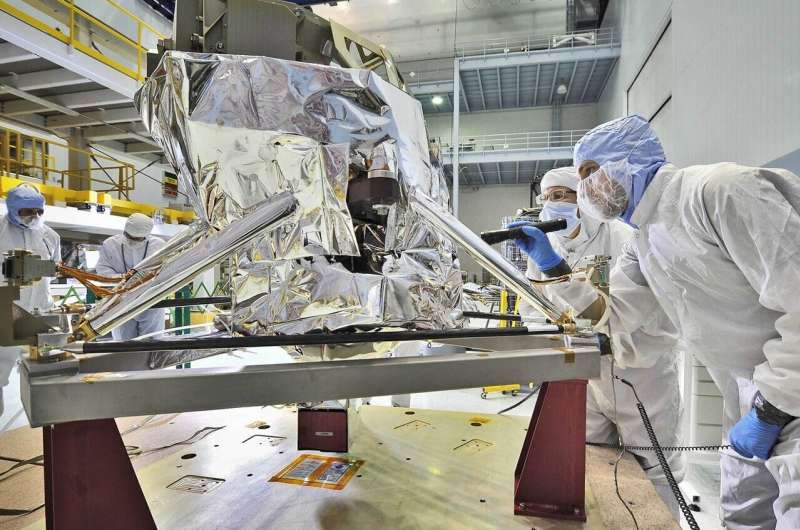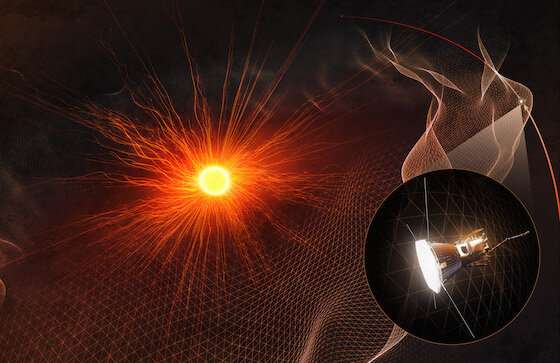
Copernical Team
Rocket Lab to acquire SolAero Holdings for its space solar power products
 Rocket Lab USA has signed a definitive agreement to acquire SolAero Holdings, Inc. (SolAero), a premier supplier of space solar power products and precision aerospace structures for the global aerospace market, for $80 million in cash. The acquisition is expected to close in the first quarter of 2022.
The acquisition aligns with Rocket Lab's growth strategy of vertical integration to deliv
Rocket Lab USA has signed a definitive agreement to acquire SolAero Holdings, Inc. (SolAero), a premier supplier of space solar power products and precision aerospace structures for the global aerospace market, for $80 million in cash. The acquisition is expected to close in the first quarter of 2022.
The acquisition aligns with Rocket Lab's growth strategy of vertical integration to deliv Sols 3326-3327: Backing away from the cliff
 As we continue exploring Maria Gordon notch, we are planning a touch and go with lots of remote sensing activities between the "touch" and the "go."
MSL is parked near the base of the cliff to the west, and the science team is interested in investigating the bedrock in this area.
Unfortunately, none of the bedrock targets shown near the top of the image above are suitable for close A
As we continue exploring Maria Gordon notch, we are planning a touch and go with lots of remote sensing activities between the "touch" and the "go."
MSL is parked near the base of the cliff to the west, and the science team is interested in investigating the bedrock in this area.
Unfortunately, none of the bedrock targets shown near the top of the image above are suitable for close A Scientists envision what Mars would look like as an exoplanet
 In science fiction movies and television shows, real-life locations on Earth, such as California's Redwood National Forest and the Sahara Desert, have long been used to represent alien worlds. But recently, in a Star Trek-style twist, a group of scientists, including researchers at the Laboratory for Atmospheric and Space Physics (LASP) at the University of Colorado Boulder, have been using a pl
In science fiction movies and television shows, real-life locations on Earth, such as California's Redwood National Forest and the Sahara Desert, have long been used to represent alien worlds. But recently, in a Star Trek-style twist, a group of scientists, including researchers at the Laboratory for Atmospheric and Space Physics (LASP) at the University of Colorado Boulder, have been using a pl NASA begins testing robotics to bring first samples back from Mars
 Testing has already begun on what would be the most sophisticated endeavor ever attempted at the Red Planet: bringing rock and sediment samples from Mars to Earth for closer study. The multi-mission Mars Sample Return campaign began when NASA's Perseverance rover landed on Mars this past February to collect Martian rock samples in search of ancient microscopic life.
Out of Perseverance's 4
Testing has already begun on what would be the most sophisticated endeavor ever attempted at the Red Planet: bringing rock and sediment samples from Mars to Earth for closer study. The multi-mission Mars Sample Return campaign began when NASA's Perseverance rover landed on Mars this past February to collect Martian rock samples in search of ancient microscopic life.
Out of Perseverance's 4 Tiny meteors leave smoke in the atmosphere
 It's time for the Geminids, the annual December meteor shower! Every year, Earth passes through the debris trail from the asteroid 3200 Phaethon. The pea-sized rocks it leaves behind burn up in our atmosphere, producing glowing trails in the night sky. People around the world will stare skyward and marvel at these meteors, also known as shooting stars.
What we can't see with the naked eye
It's time for the Geminids, the annual December meteor shower! Every year, Earth passes through the debris trail from the asteroid 3200 Phaethon. The pea-sized rocks it leaves behind burn up in our atmosphere, producing glowing trails in the night sky. People around the world will stare skyward and marvel at these meteors, also known as shooting stars.
What we can't see with the naked eye BWXT Delivers Fuel to NASA to Support Nuclear Thermal Propulsion
 BWX Technologies, Inc. has reached a critical milestone in the nation's pursuit of space nuclear propulsion by delivering coated reactor fuels to NASA in support of its space nuclear propulsion project within the agency's Space Technology Mission Directorate.
Nuclear Thermal Propulsion (NTP) is one of the technologies that is capable of propelling a spacecraft to Mars and back. Innovative
BWX Technologies, Inc. has reached a critical milestone in the nation's pursuit of space nuclear propulsion by delivering coated reactor fuels to NASA in support of its space nuclear propulsion project within the agency's Space Technology Mission Directorate.
Nuclear Thermal Propulsion (NTP) is one of the technologies that is capable of propelling a spacecraft to Mars and back. Innovative NASA selects second private astronaut mission to Space Station
 NASA has selected Axiom Space for the second private astronaut mission to the International Space Station. NASA will negotiate with Axiom on a mission order agreement for the Axiom Mission 2 (Ax-2) targeted to launch between fall 2022 and late spring 2023.
Ax-2 will launch from NASA's Kennedy Space Center in Florida for a mission of no more than 14 days docked to the space station. NASA an
NASA has selected Axiom Space for the second private astronaut mission to the International Space Station. NASA will negotiate with Axiom on a mission order agreement for the Axiom Mission 2 (Ax-2) targeted to launch between fall 2022 and late spring 2023.
Ax-2 will launch from NASA's Kennedy Space Center in Florida for a mission of no more than 14 days docked to the space station. NASA an Experiments riding 24th SpaceX cargo mission to space station study bioprinting, crystallization, laundry

The 24th SpaceX cargo resupply services mission, targeted to launch in late December from NASA's Kennedy Space Center in Florida, carries scientific research and technology demonstrations to the International Space Station. The experiments aboard include studies of bioprinting, crystallization of monoclonal antibodies, changes in immune function, plant gene expression changes, laundering clothes in space, processing alloys, and student citizen science projects.
Learn more about these scientific experiments riding aboard the Dragon spacecraft to the orbiting lab:
Bioprinting bandages
Bioprinting, a subcategory of 3D printing, uses viable cells and biological molecules to print tissue structures. A study from the German Space Agency, Bioprint FirstAid, demonstrates a portable, handheld bioprinter that uses a patient's own skin cells to create a tissue-forming patch to cover a wound and accelerate the healing process.
NASA's Webb telescope will have the coolest camera in space

Set to launch on Dec. 22, NASA's James Webb Space Telescope is the largest space observatory in history, and it has an equally gargantuan task: to collect infrared light from the distant corners of the cosmos, enabling scientists to probe the structures and origins of our universe and our place in it.
Many cosmic objects – including stars and planets, as well as the gas and dust from where they form – emit infrared light, sometimes called heat radiation. But so do most other warm objects, like toasters, humans, and electronics. That means Webb's four infrared instruments can detect their own infrared glow.
Parker Solar Probe: A spacecraft has 'touched' the sun for the first time

On April 28, 2021, at 0933 UT (3:33 a.m. Eastern Daylight Time), NASA's Parker Solar Probe reached the sun's extended solar atmosphere, known as the corona, and spent five hours there. The spacecraft is the first to enter the outer boundaries of our sun.
The results, published in Physical Review Letters, were announced in a press conference at the American Geophysical Union Fall Meeting 2021 on December 14. The manuscript is open-access and freely available to download.
"This marks the achievement of the primary objective of the Parker mission and a new era for understanding the physics of the corona," said Justin C. Kasper, the first author, Deputy Chief Technology Officer at BWX Technologies, and a professor at the University of Michigan. The mission is led by the Johns Hopkins University Applied Physics Laboratory (JHU/APL).
